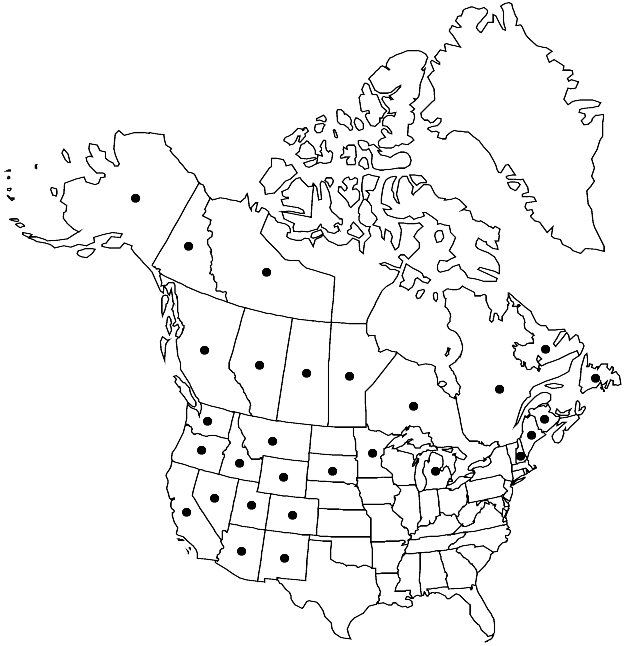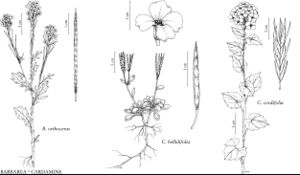Difference between revisions of "Barbarea orthoceras"
Index Seminum (Dorpat) 2. 1824.
FNA>Volume Importer |
imported>Volume Importer |
||
| (2 intermediate revisions by 2 users not shown) | |||
| Line 6: | Line 6: | ||
|place=2. 1824 | |place=2. 1824 | ||
|year=1824 | |year=1824 | ||
| + | }} | ||
| + | |special_status={{Treatment/ID/Special_status | ||
| + | |code=F | ||
| + | |label=Illustrated | ||
}} | }} | ||
|basionyms= | |basionyms= | ||
| Line 57: | Line 61: | ||
|publication title=Index Seminum (Dorpat) | |publication title=Index Seminum (Dorpat) | ||
|publication year=1824 | |publication year=1824 | ||
| − | |special status= | + | |special status=Illustrated |
| − | |source xml=https:// | + | |source xml=https://bitbucket.org/aafc-mbb/fna-data-curation/src/2e0870ddd59836b60bcf96646a41e87ea5a5943a/coarse_grained_fna_xml/V7/V7_707.xml |
|tribe=Brassicaceae tribe Cardamineae | |tribe=Brassicaceae tribe Cardamineae | ||
|genus=Barbarea | |genus=Barbarea | ||
Latest revision as of 22:35, 5 November 2020
Biennials or perennials; usually glabrous, except blade auricles often ciliate. Stems (1–)2–6(–10) dm. Basal leaves: petiole (0.5–)1–7(–15) cm, (rarely ciliate basally); blade usually lyrate-pinnatifid, (1–)1.5–6(–11) cm, lobes (0, 1, or) 2–4 (or 5) on each side, lateral lobes oblong or ovate, 0.2–1 cm × 1–5 mm, not fleshy, margins entire, terminal lobe 1.5–5 cm × 10–25 mm. Cauline leaves: blade usually lyrate-pinnatifid (sometimes undivided and margins coarsely toothed or subentire), lateral lobes 1–4, (usually oblong or ovate, rarely lanceolate, to 2 × 1 cm), margins entire, (terminal lobe to 5 × 3 cm, margins usually entire or repand, rarely dentate); conspicuously auriculate, auricles ovate or narrowly oblong, (to 8 × 5 mm, margins entire). Fruiting pedicels erect or ascending, (2–)3–6(–7) mm, terete or subquadrangular, stout, (narrower than fruit). Flowers: sepals 2.5–3.5 × 1–1.5 mm, lateral pair slightly saccate basally, margins scarious, (subapically sparsely pubescent or glabrous); petals yellow or pale yellow, oblanceolate, 5–7(–8) × (1.5–)2–3 mm, base attenuate, apex rounded; filaments 3–4.5 mm; anthers 1 mm; ovules (24–)26–36 per ovary; gynophore to 0.5 mm. Fruits erect to erect-ascending, rarely appressed to rachis, torulose, terete to subquadrangular, (2.5–)3.1–4(–4.5) cm × 1.5–2 mm; style stout, 0.5–1.2(–2) mm. Seeds brown, somewhat plump, ovoid or oblong, 1.2–1.5 × 0.9–1 mm. 2n = 16.
Phenology: Flowering Mar–Jul.
Habitat: Open grassland, sandbars, scree, alpine meadows, ledges, rocky cliffs, forests, streamsides, railroad embankment, boggy ground, gravel pits, moist grassy slopes
Elevation: 0-3400 m
Distribution

Alta., B.C., Man., N.B., Nfld. and Labr., N.W.T., Ont., Que., Sask., Yukon, Alaska, Ariz., Calif., Colo., Idaho, Maine, Mich., Minn., Mont., Nev., N.H., N.Mex., Oreg., S.Dak., Utah, Wash., Wyo., e, c Asia.
Discussion
M. L. Fernald (1909) reported the southwestern Asian Barbarea plantaginea de Candolle from Alaska, but it is certain that his records were based on plants of B. orthoceras, which is rather rare in New England, where it appears to be restricted to portions of northern Maine and New Hampshire.
Selected References
None.
